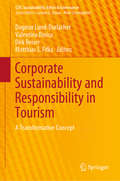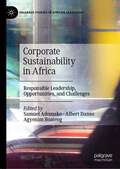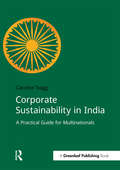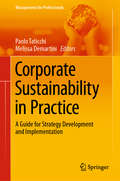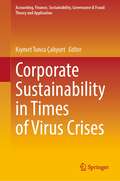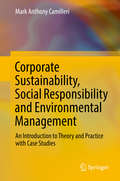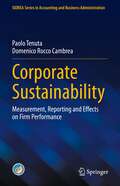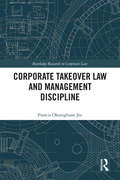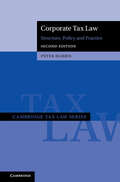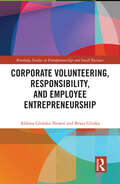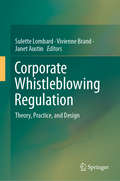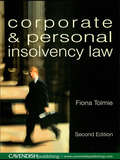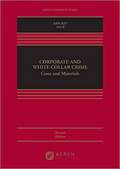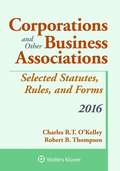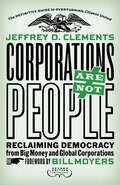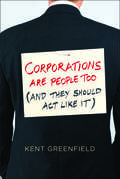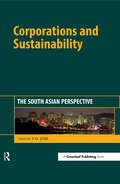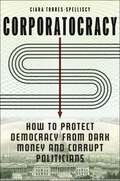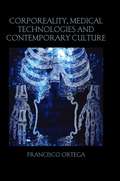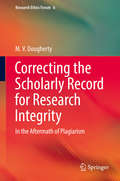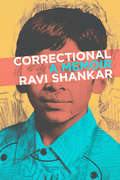- Table View
- List View
Corporate Sustainability and Responsibility in Tourism: A Transformative Concept (CSR, Sustainability, Ethics & Governance)
by Matthias S. Fifka Dagmar Lund-Durlacher Dirk Reiser Valentina DinicaThis book offers essential insights into how the world's second largest industry, tourism, is responding to challenges involved in expanding the corporate social responsibility (CSR) concept to corporate sustainability and responsibility, referred to as CSR 2.0. It analyzes the typical setup of tourism with various types of commercial agents: corporations, small and medium sized enterprises, public-private partnerships, social enterprises and local cooperatives. In addition, the book examines a broad range of voluntary initiatives, the effectiveness of these efforts, and how contextual and wider policy features shape these relationships. The book is divided into three parts, the first of which elaborates on strategic drivers and rationales for CSR. In turn, the second part introduces readers to design approaches for CSR programs and envisaged impacts, while part three focuses on implementation, certification, reporting, and possible outcomes. Each part offers a mixture of theoretical perspectives, synthesis analyses and case studies. The respective chapters tackle a broad spectrum of tourism sub-sectors, e.g. the cruise industry, aviation, gastronomy, nature-based tourism, and urban destinations.
Corporate Sustainability in Africa: Responsible Leadership, Opportunities, and Challenges (Palgrave Studies in African Leadership)
by Agyenim Boateng Samuel Adomako Albert DansoThis book addresses empirical, theoretical, and policy perspectives in its examination of the development of sustainability management of African firms. Documenting cases of sustainable activities across Africa and accelerating knowledge about the opportunities and challenges facing firms operating in Africa, the chapters examine various aspects of sustainability and sustainable entrepreneurship/innovations in the African context. The authors seek to understand how African nations can be positioned to meet the 2030 Sustainable Development Goals as well as the innovative strategies necessary to improve sustainability practices of African firms for greater success. With guidance for scholars and policymakers, this book will serve as a valuable resource, providing readers with an up-to-date and contextual understanding of sustainability practices, drivers, and challenges in Africa.
Corporate Sustainability in India: A Practical Guide for Multinationals (DoShorts)
by Caroline TwiggThis short guide offers practical insights for companies or foundations who want to run their business in India in a sustainable way.In this concise, expert guide, Caroline Twigg draws on her experience of setting up the India office for the World Business Council for Sustainable Development. She starts with a brief overview of India's history, culture and relationship with the environment, presents an overview of doing business in India in general, and then covers: policy and regulations that influence sustainability actions in India; how sustainability is interpreted in India and how that may impact a company's engagement; how companies already work on sustainability and what might come in the future; a valuable list of the organizations and resources that will help you deliver on your business and sustainability goals.If you work for an international company based outside of India, if you run a foundation with projects in India, if you have products or services with a sustainability focus and are hoping to expand your business in India, or if you are tasked with communicating your company's sustainability work in India, this book will help you engage with your partners respectfully, effectively and easily.
Corporate Sustainability in Practice: A Guide for Strategy Development and Implementation (Management for Professionals)
by Paolo Taticchi Melissa DemartiniBuilding better organisations, with a clear sense of purpose, is a common challenge faced by many entrepreneurs and executives in industry. A fully integrated corporate sustainability strategy can help organisations to better manage risks, to win business opportunities and to ultimately strengthen reputation. Building on the experience of renowned strategists, sustainability, finance and academic experts, this book offers practical tools and approaches that can be used to develop and implement fully integrated corporate sustainability strategies.
Corporate Sustainability in Times of Virus Crises (Accounting, Finance, Sustainability, Governance & Fraud: Theory and Application)
by Kıymet Tunca ÇalıyurtThis book analyses the effect of biological risk on business and management by considering case studies from Malaysia, Lebanon, and G20 countries during the COVID-19 pandemic. Covering a wide range of topics, such as effects of virus risk on corporate sustainability, COVID-19 and CSR activities, governance practices and regulations for derivative products in emerging markets, risk management during a pandemic, and AI applications in the health sector, this book assists top management in redesigning business models and organisational management in a post-pandemic world and in becoming better equipped to tackle future biological risks or pandemic events.
Corporate Sustainability, Social Responsibility and Environmental Management: An Introduction to Theory and Practice with Case Studies (Csr, Sustainability, Ethics And Governance Ser.)
by Mark Anthony CamilleriThis book provides a concise and authoritative guide to corporate social responsibility (CSR) and related paradigms, including environmental responsibility, corporate sustainability and responsibility, creating shared value, strategic CSR, stakeholder engagement, corporate citizenship, business ethics and corporate governance, among others. It is primarily intended for advanced undergraduate and / or graduate students. Moreover, it is highly relevant for future entrepreneurs, small business owners, non-profit organisations and charitable foundations, as it addresses the core aspects of contemporary strategies, public policies and practices. It also features case studies on international policies and principles, exploring corporate businesses’ environmental, social and governance reporting.“Mark Camilleri’s new book provides an excellent overview of the eclectic academic literature in this area, and presents a lucid description of how savvy companies can embed themselves in circular systems that reduce system-wide externalities, increase economic value, and build reputation. A valuable contribution.”Charles J. Fombrun, Founder of Reputation Institute and a former Professor of Management at New York University and The Wharton School, University of Pennsylvania, USA“I am pleased to recommend Dr. Camilleri’s latest book, Corporate Sustainability, Social Responsibility, and Environmental Management. The book is a rich source of thought for everyone who wants to get deeper insights into this important topic. The accompanying five detailed case studies on a wide array of corporate sustainable and responsible initiatives are helpful in demonstrating how theoretical frameworks have been implemented into practical initiatives. This book is a critical companion for academics, students, and practitioners.”Adam Lindgreen, Professor and Head of Department of Marketing, Copenhagen Business School, Denmark“This book is an essential resource for students, practitioners, and scholars. Dr. Mark Camilleri skillfully delivers a robust summary of research on the business and society relationship and insightfully points to new understandings of and opportunities for responsible business conduct. I highly recommend Corporate Sustainability, Social Responsibility, and Environmental Management: An Introduction to Theory and Practice with Case Studies."Diane L. Swanson, Professor and Chair of Distinction in Business Administration and Ethics Education at Kansas State University, KS, USA"Mark’s latest book is lucid, insightful, and highly useful in the classroom. I strongly recommend it."Donald Siegel, Dean of the School of Business and Professor of Management at the University at Albany, State University of New York, NY, USA“The theory and practice of corporate sustainability, social responsibility and environmental management is complex and dynamic. This book will help scholars to navigate through the maze. Dr Camilleri builds on the foundations of leading academics, and shows how the subject continues to evolve. The book also acknowledges the importance of CSR 2.0 - or transformative corporate sustainability and responsibility - as a necessary vision of the future.”Wayne Visser, Senior Associate at Cambridge University, UK. He is the author of CSR 2.0: Transforming Corporate Sustainability & Responsibility and Sustainable Frontiers: Unlocking Change Through Business, Leadership and Innovation"Corporate Sustainability, Social Responsibility and Environmental Management: An Introduction to Theory and Practice with Case Studies" provides a useful theoretical and
Corporate Sustainability: Measurement, Reporting and Effects on Firm Performance (SIDREA Series in Accounting and Business Administration)
by Paolo Tenuta Domenico Rocco CambreaThis book introduces readers to the main types of corporate sustainability practices. The first section examines both the ratings provided by international agencies and the various ESG (Environmental, Social and Government) indexes existing at 2021. In turn, the second part empirically investigates the relationship between the level of corporate sustainability and corporate financial performance among the large companies listed on the Milan Exchange FTSE-MIB 40 index for 2015-2019. The book offers a comprehensive overview of current sustainability concepts and practices and illustrates how various companies are seeking to integrate them in their competitive strategy. Further, it fills a gap in the extant literature by analysing the origins, historical evolution and structure of the main rating agencies and ESG indexes. In addition, the empirical analysis of corporate sustainability’s impact on companies’ financial performance reveals the importance of collegial leadership – a commonly found feature of Italian family businesses that has not been considered in previous studies – as a moderating factor for reconciling sustainability initiatives and performance at family-run firms.
Corporate Takeover Law and Management Discipline (Routledge Research in Corporate Law)
by Francis A Okanigbuan JnrThis book examines the effectiveness of corporate takeovers. The dominant ideologies of corporate takeovers include synergistic gains and its managerial disciplinary role. These dominant themes are being undermined by the challenges of costly acquisitions. The UK Takeover Code is a regulatory response to the role of managers of target companies only. Also, the regulatory framework for takeovers in the United States is largely focused on target companies. The book demonstrates that managements can influence the role of takeovers, thereby undermining its synergistic and disciplinary values. Presenting an identification and evaluation of the limits of current regulatory and judicial control over the role of management during takeovers in the UK and the US -Delaware, it will identify the relevance of institutional control as an effective mechanism for addressing the challenges of managerial influence over takeover functions. It will also identify how the role of managements can be addressed with the complementary benefit to shareholder and employee interests; thereby challenging the shareholder/ stakeholder primacy debate in corporate law, particularly in relation to takeovers. This book will be essential reading for scholars and students interested in the market for corporate control, corporate law and company law.
Corporate Tax Law: Structure, Policy and Practice (Cambridge Tax Law Series)
by Peter HarrisNew edition taking account of the substantial developments of the last decade. It considers the Trump US tax reforms of late 2017 and then the Biden reforms of 2022. It recognises the economic rise of China by incorporating its corporate tax system for comparison. This creates increased balance, introducing a second civil law jurisdiction. This edition also incorporates many changes resulting from international tax developments including the Base Erosion and Profit Shifting reports and the current Two Pillar approach. The edition documents how corporate and international tax systems are increasingly integrated. This is particularly the case with minimum taxes, hybrid financial instruments and excessive debt financing. The interface between corporate tax base and financial accounts is another area of particular interest. Countries continue to tinker with the use of corporate losses, corporate tax rates and dividend relief. Other areas of development include corporate tax subjects, buy backs and dividend stripping.
Corporate Volunteering, Responsibility and Employee Entrepreneurship (Routledge Studies in Entrepreneurship and Small Business)
by Beata Glinka Aldona Glińska-NeweśSupporting employee entrepreneurship is among major challenges contemporary organizations face. Many facets of corporate entrepreneurship are investigated, and the body of knowledge in the field is growing rapidly; nevertheless, there are still knowledge and research gaps to be filled. Notably, while there are studies linking HRM with corporate entrepreneurship, studies on connections between CSR-oriented practices and corporate/employee entrepreneurship are to be developed. The main goal of this book is to explain relationships between corporate volunteering and employee entrepreneurship in organisations. The book combines two extremely vivid fields of research: entrepreneurship and corporate social responsibility. Based on their own research, the authors present how participation in corporate volunteering, as one of the CSR practices in organisations, leads to strengthening employee entrepreneurial behaviour. The book offers a framework showing the role of CSR practices in shaping entrepreneurial and innovative employees’ behaviour. This book is aimed mainly at postgraduates, researchers and academics in the fields of entrepreneurship and corporate volunteering. As it touches vital fields of managerial education and management, it will also be of interest to master level students at universities or business schools as well as business practitioners.
Corporate Volunteering, Responsibility and Employee Entrepreneurship (Routledge Studies in Entrepreneurship and Small Business)
by Beata Glinka Aldona Glińska-NeweśSupporting employee entrepreneurship is among major challenges contemporary organizations face. Many facets of corporate entrepreneurship are investigated, and the body of knowledge in the field is growing rapidly; nevertheless, there are still knowledge and research gaps to be filled. Notably, while there are studies linking HRM with corporate entrepreneurship, studies on connections between CSR-oriented practices and corporate/employee entrepreneurship are to be developed.The main goal of this book is to explain relationships between corporate volunteering and employee entrepreneurship in organisations. The book combines two extremely vivid fields of research: entrepreneurship and corporate social responsibility. Based on their own research, the authors present how participation in corporate volunteering, as one of the CSR practices in organisations, leads to strengthening employee entrepreneurial behaviour. The book offers a framework showing the role of CSR practices in shaping entrepreneurial and innovative employees’ behaviour.This book is aimed mainly at postgraduates, researchers and academics in the fields of entrepreneurship and corporate volunteering. As it touches vital fields of managerial education and management, it will also be of interest to master level students at universities or business schools as well as business practitioners.
Corporate Whistleblowing Regulation: Theory, Practice, and Design
by Sulette Lombard Vivienne Brand Janet AustinThis book adopts a cross-jurisdictional perspective to consider contemporary corporate whistleblowing issues from an ethical theoretical perspective, regulatory perspective, and practical perspective. It includes in particular arguments in favour of and against the adoption of financial incentive schemes for whistleblowers, as well as the potential implications of adopting such schemes. This approach provides a valuable opportunity for comparison from a law reform perspective. The book brings together authors from various jurisdictions – Canada, Australia, and the USA – who, through their exposure to this area of law, be it as practitioners, regulators, or academics, offer valuable and interesting insights on the emerging and topical area of corporate whistleblowing generally, and whistleblowing rewards in particular. These three jurisdictions were selected on the basis of their reform-oriented stance on corporate whistleblowing and/or implementation of financial incentives for whistleblowing, creating an opportunity to assess contemporary regulatory structures and in particular how incentives measures could interact with corporate whistleblowing regulatory frameworks, and how they could contribute to improved governance. The reasons for the rejection of the notion of financial incentives in the United Kingdom are also reviewed, in order to provide a comparative overview. The book provides useful guidance for those who may be affected by the implementation of corporate whistleblowing schemes, including for reward, whether as regulators, practitioners, company directors, or whistle blowers.
Corporate and Personal Insolvency Law
by Fiona TolmieFirst published in 2003. Routledge is an imprint of Taylor & Francis, an informa company.
Corporate and White Collar Crime: Cases and Materials (Aspen Casebook Series)
by Jennifer Taub Kathleen F. BrickeyCorporate and White Collar Crime: Cases and Materials provides systematic and comprehensive consideration of major white-collar crime statutes in the federal criminal code, securities laws, and environmental statutes. <p><p> New to the Seventh Edition: <p> Shift in corporate prosecution policy and individual accountability from Obama-era Deputy Attorney General Sally Yates to Trump-era Deputy Attorney General Rod Rosenstein Obstruction of Justice as set out in the Mueller Report on the Investigation into Russian Interference in the 2016 Presidential Election<p> High profile Supreme Court decision in the Bridgegate case, Kelly v. United States, 590 U.S. ___ (2020) on the limits of Honest Services Fraud prosecution Additional commentary on the apparent corporate crime wave, use of deferred prosecution and non-prosecution agreements, and white collar crime victims<p><p> Professors and students will benefit from: <p> Up-to-date examples of high-profile white collar crime investigations and legal opinions including the Supreme Court decision involving the Governor of Virginia and the Bridgegate case, as well as the Mueller investigation report<p> Energetic and clear written explanations of white collar criminal offenses and concise case excerpts<p> Attention to the Responsible Corporate Officer doctrine and individual responsibility for corporate crime more generally<p> Case selection that clearly illustrates the elements of proof for the main federal white collar criminal offenses
Corporation Nation
by Robert E. WrightFrom bank bailouts and corporate scandals to the financial panic of 2008 and its lingering effects, corporate governance in America has been wracked with crises. Amid a weakening system of checks and balances in which corporate executives have little incentive to protect shareholder interests, U.S. corporations are growing larger and more irresponsible at the same time. But dependence on corporate profit was crucial to the early republic's growth, success, and security: despite protests that incorporated business was an inefficient and potentially corrupting system, U.S. state governments chartered more corporations per capita than any other nation--including Britain--effectively making the United States a "corporation nation." Drawing on legal and economic history, Robert E. Wright traces the development and decline of corporate institutions in America, connecting today's financial failures to deteriorating corporate law.In the nineteenth century, checks and balances kept managerial interests aligned with those of stockholders, and public opinion grew supportive as corporations raised billions of dollars to finance infrastructure such as transportation networks, financial systems, and manufacturing operations. But many of these checks and balances were dismantled after the Civil War, allowing leeway for the managerial malfeasance that spiraled into economic crisis in the twenty-first century. Bolstered with archival and original data, including the first complete count of American business corporations before the Civil War, Corporation Nation makes a compelling argument for improved internal governance and more effective external government regulation.
Corporations And Other Business Associations: Selected Statutes, Rules, And Forms (2016 Edition)
by Charles R. T. O'Kelley Robert B. ThompsonCorporations and Other Business Associations Selected Statutes, Rules, and Forms: 2016 Supplement
Corporations Are Not People: Reclaiming Democracy from Big Money and Global Corporations
by Jeffrey D. ClementsA revised and updated edition of the definitive guide to overturning Citizens United. Since the Supreme Court&’s Citizens United ruling that the rights of things—money and corporations—matter more than the rights of people, America has faced a crisis of democracy. In this timely and thoroughly updated second edition, Jeff Clements describes the strange history of this bizarre ruling, its ongoing destructive effects, and the growing movement to reverse it. He includes a new chapter, &“Do Something!,&” showing how—state by state and community by community—Americans are using creative strategies and tools to renew democracy and curb unbalanced corporate power. Since the first edition, sixteen states, one-hundred-sixty members of Congress, and five hundred cities and towns have called for a constitutional amendment to overturn Citizens United, and the list is growing. This is a fight we can win! &“More relevant than ever, this updated edition of Corporations Are Not People chronicles the remarkably vibrant, nationwide grassroots movement to &‘get money out and voters in.&’&” —Katrina vanden Heuvel, Editor and Publisher, The Nation
Corporations Are People Too: (And They Should Act Like It)
by Kent GreenfieldWhy we’re better off treating corporations as people under the law—and making them behave like citizens Are corporations people? The U.S. Supreme Court launched a heated debate when it ruled in Citizens United that corporations can claim the same free speech rights as humans. Should corporations be able to claim rights of free speech, religious conscience, and due process? Kent Greenfield provides an answer: Sometimes. With an analysis sure to challenge the assumptions of both progressives and conservatives, Greenfield explores corporations' claims to constitutional rights and the foundational conflicts about their obligations in society. He argues that a blanket opposition to corporate personhood is misguided, since it is consistent with both the purpose of corporations and the Constitution itself that corporations can claim rights at least some of the time. The problem with Citizens United is not that corporations have a right to speak, but for whom they speak. The solution is not to end corporate personhood but to require corporations to act more like citizens.
Corporations and American Democracy
by William J. Novak Naomi R. LamoreauxRecent Supreme Court decisions in Citizens United and other high-profile cases have sparked disagreement about the role of corporations in American democracy. Bringing together scholars of history, law, and political science, Corporations and American Democracy provides essential grounding for today’s policy debates.
Corporations and Sustainability: The South Asian Perspective
by Jose P DCorporations and Sustainability: The South Asian Perspective is a collection of contributions from leading academics and practitioners which provides an overview of the key challenges and opportunities related to sustainability in South Asia. The last two decades have seen rapid and often dramatic changes in the institutional, economic and ecological contexts in which firms operating in South Asian economies find themselves. South Asia is increasingly seen both as a driver of global economic growth as well as a barrier to sustainable development. The most significant driver of change in the region has been the economic liberalization attempts of national governments, resulting in easier and faster flows of information, labour and capital between these economies and the rest of the world. Consequently, global environmental and social concerns are increasingly driving governmental and corporate decision-making processes for firms operating in South Asia. In responding to these emerging challenges, firms have begun to re-evaluate and redesign their strategies, structures and processes as well as incorporate sustainability principles into their strategies.Corporations and Sustainability: The South Asian Perspective thus delivers an important perspective for researchers as well as students of master's-level courses on business and environment. It is particularly useful for those trying to understand the key sustainability challenges in the South Asian context as well some of the solutions emerging in the critical areas of heavy industry and also service sectors.
Corporatocracy: How to Protect Democracy from Dark Money and Corrupt Politicians
by Ciara Torres-SpelliscyReveals how corporate greed led to scandal, corruption, and the January 6th insurrection—and how we can stop it from happening againDonald Trump’s false claims of election fraud and the violence of the Capitol riot have made it unavoidably clear that the future of American democracy is in peril. Unseen political actors and untraceable dark money influence our elections, while anti-democratic rhetoric threatens a tilt towards authoritarianism.In Corporatocracy, Ciara Torres-Spelliscy reveals the role corporations play in this dire state of political affairs, and explains why and how they should be held accountable by the courts, their shareholders, and citizens themselves. Drawing on key Supreme Court cases, Torres-Spelliscy explores how corporations have, more often than not, been on the wrong side of history by working to undermine democratic norms, practices, and laws. From bankrolling regressive politicians to funding ghost candidates with dark money, she shows us how corporations subvert the will of the American people, and how courts struggle to hold them and corrupt politicians accountable.Corporations have existed far longer than democracies have. If voters, consumers, and investors are not careful, corporations may well outlive democracy. Corporatocracy brings all of these shadowy tactics to light and offers meaningful legal reforms that can strengthen and protect American democracy.
Corporeality, Medical Technologies and Contemporary Culture: Corporeality, Medical Technologies And Contemporary Culture (Birkbeck Law Press)
by Francisco OrtegaThis book examines the confusions and contradictions that manifest in prevalent attitudes towards the body, as well as in related bodily practices. The body is simultaneously our reference for the certainties of nature and the locus of a desire for transformation and reinvention. The body is at the same time worshipped and despised; an object of desire and of design. Francisco Ortega analyses how the body has become both a screen for the projection of our ideas and imaginings about ourselves and conversely an object of suspicion, anxiety, and discomfort. Addressing practices of corporeal ascesis (such as bodybuilding and dietetics), medical technologies, and radical anatomical modifications, Ortega documents the ambiguous legacy of a western theoretical tradition that has always despised the body. Utilising a theoretical framework that is mainly informed by the phenomenology of the body, feminist theory, disability studies and the thought of Michel Foucault, Corporeality, Medical Technologies and Contemporary Culture address several ethical and psychological issues associated with the experience and perception of the body in our cultural landscape. Drawing on these diverse areas of philosophical and analytical work, this book will interest those researching Law, Medicine, and Sociology.
Corpse: Nature, Forensics, And The Struggle To Pinpoint Time Of Death
by Jessica Snyder SachsWhen detectives come upon a murder victim, there's one thing they want to know above all else: When did the victim die? The answer can narrow a group of suspects, make or break an alibi, even assign a name to an unidentified body. But outside the fictional world of murder mysteries, time-of-death determinations have remained infamously elusive, bedeviling criminal investigators throughout history. Armed with an array of high-tech devices and tests, the world's best forensic pathologists are doing their best to shift the balance, but as Jessica Snyder Sachs demonstrates so eloquently in Corpse, this is a case in which nature might just trump technology: Plants, chemicals, and insects found near the body are turning out to be the fiercest weapons in our crime-fighting arsenal. In this highly original book, Sachs accompanies an eccentric group of entomologists, anthropologists, biochemists, and botanists--a new kind of biological "Mod Squad"--on some of their grisliest, most intractable cases. She also takes us into the courtroom, where "post-O. J. " forensic science as a whole is coming under fire and the new multidisciplinary art of forensic ecology is struggling to establish its credibility. Corpse is the fascinating story of the 2000year search to pinpoint time of death. It is also the terrible and beautiful story of what happens to our bodies when we die.
Correcting the Scholarly Record for Research Integrity: In the Aftermath of Plagiarism (Research Ethics Forum #6)
by M. V. DoughertyThis volume is the first book-length study on post-publication responses to academic plagiarism in humanities disciplines. It demonstrates that the correction of the scholarly literature for plagiarism is not a task for editors and publishers alone; each member of the research community has an indispensable role in maintaining the integrity of the published literature in the aftermath of plagiarism. If untreated, academic plagiarism damages the integrity of the scholarly record, corrupts the surrounding academic enterprise, and creates inefficiencies across all levels of knowledge production. By providing case studies from the field of philosophy and related disciplines, the volume exhibits that current post-publication responses to academic plagiarism are insufficient. It catalogues how humanities disciplines fall short in comparison with the natural and biomedical sciences for ensuring the integrity of the body of published research. This volume provides clarity about how to conceptualize the scholarly record, surveys the traditional methods for correcting it, and argues for new interventions to improve the reliability of the body of published research. The book is valuable not only to those in the field of philosophy and other humanities disciplines, but also to those interested in research ethics, meta-science, and the sociology of research.
Correctional
by Ravi ShankarThe first time Ravi Shankar was arrested, he spoke out against racist policing on National Public Radio and successfully sued the city of New York. The second time, he was incarcerated when his promotion to full professor was finalized. During his ninety-day pretrial confinement at the Hartford Correctional Center—a level 4, high-security urban jail in Connecticut—he met men who shared harrowing and heart-felt stories. The experience taught him about the persistence of structural racism, the limitations of mass media, and the pervasive traumas of twenty-first-century daily life. Shankar’s bold and complex self-portrait—and portrait of America—challenges us to rethink our complicity in the criminal justice system and mental health policies that perpetuate inequity and harm. Correctional dives into the inner workings of his mind and heart, framing his unexpected encounters with law and order through the lenses of race, class, privilege, and his bicultural upbringing as the first and only son of South Indian immigrants. Vignettes from his early life set the scene for his spectacular fall and subsequent struggle to come to terms with his own demons. Many of them, it turns out, are also our own.
